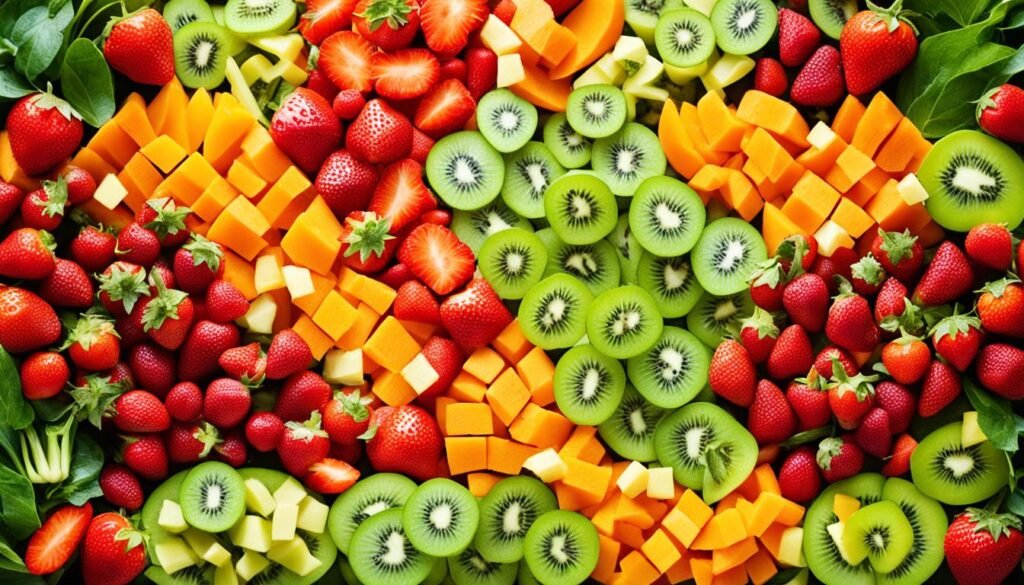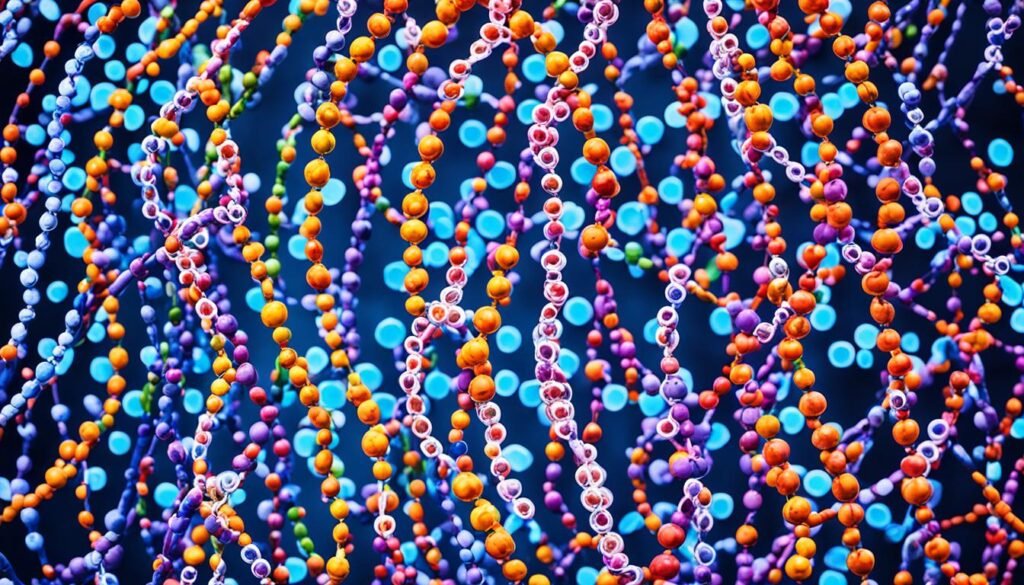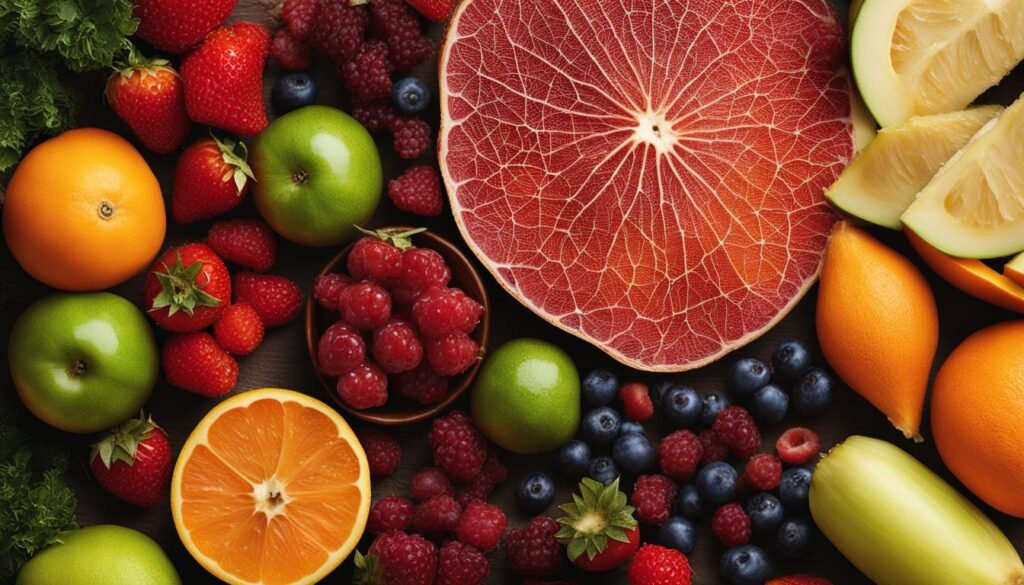Collagen, the protein responsible for maintaining our skin’s strength and elasticity, diminishes as we age, leading to signs of aging like fine lines and wrinkles. But did you know that there are natural ways to boost collagen production and achieve a radiant, youthful glow without invasive procedures or expensive treatments? In this article, we’ll explore how you can enhance collagen levels in your skin through nutrition, skincare, exercise, and more.
Key Takeaways:
- Include collagen-boosting foods in your diet like bone broth, citrus fruits, and leafy greens
- Consider collagen supplements, such as hydrolyzed collagen or collagen peptides, to enhance collagen levels
- Protect your skin from sun damage with regular sunscreen use
- Maintain skin hydration to support collagen production
- Choose collagen-boosting peptide serums or supplements to improve skin texture and firmness
Understanding the Vital Role of Collagen in the Body
Collagen is an essential protein that plays a crucial role in maintaining the health and structure of various parts of the body, including the skin, tendons, and connective tissues. It is responsible for providing strength, elasticity, and hydration to these vital components, ensuring their proper functioning.
As one of the most abundant proteins in the body, collagen acts as a building block for the skin, bones, and connective tissues. It forms a framework that supports the structure of the skin, keeping it smooth and supple. Additionally, collagen provides a flexible framework for tendons and ligaments, allowing them to withstand pressure and movement.
Collagen also plays a crucial role in maintaining skin elasticity and hydration. It helps the skin retain moisture, keeping it plump and youthful. As we age, however, collagen production naturally decreases, leading to visible signs of aging such as fine lines, wrinkles, and sagging skin.
Understanding the vital role of collagen in the body is key to finding natural ways to boost its production and maintain healthy, youthful-looking skin. By replenishing and stimulating collagen, we can support the overall health of our skin, tendons, and connective tissues, promoting elasticity, hydration, and strength.
To visualize the importance of collagen in the body, refer to the table below:
| Body Component | Role of Collagen |
|---|---|
| Skin | Provides strength, elasticity, and hydration |
| Tendons and Ligaments | Supports structure, flexibility, and movement |
| Connective Tissues | Ensures structural integrity and proper functioning |
By understanding the vital role of collagen in maintaining the health and function of the body, we can explore effective ways to boost collagen production and support the overall well-being of our skin, tendons, and connective tissues.
Stay tuned for the upcoming sections, where we will delve deeper into natural ways to boost collagen production, including collagen-boosting foods, skincare products, and physical activities.
Nutrition: Eat Collagen-Boosting Foods and Supplements
One of the most effective ways to naturally boost collagen production is through nutrition. By incorporating collagen-boosting foods into your diet, you can provide your body with the necessary building blocks for collagen synthesis. These foods are rich in nutrients that support collagen production, helping to maintain healthy and youthful-looking skin.
Some collagen-boosting foods include:
- Bone broth: Rich in amino acids and minerals, bone broth can enhance collagen production and improve skin elasticity.
- Citrus fruits: Fruits like oranges and strawberries are high in vitamin C, which plays a crucial role in collagen synthesis.
- Leafy greens: Vegetables like spinach and kale contain antioxidants and vitamins that support collagen production.
- Bell peppers: Bell peppers are a great source of vitamin C and other antioxidants, helping to protect and maintain collagen levels.
- Garlic: Garlic contains sulfur, a mineral that supports collagen synthesis and helps to maintain the structural integrity of the skin.
- Fish: Certain types of fish, such as salmon and tuna, are rich in omega-3 fatty acids, which can promote collagen production and improve skin health.
In addition to collagen-boosting foods, you can also incorporate collagen supplements into your daily routine. Hydrolyzed collagen or collagen peptides are popular options that can be easily added to your favorite beverage or food. These supplements provide an extra boost of the essential amino acids needed for collagen synthesis.

By including collagen-boosting foods and supplements in your diet, you can support the natural production of collagen in your body, resulting in healthier, more youthful-looking skin. Remember to consult with a healthcare professional before making any significant changes to your diet or starting any new supplements.
The Impact of Sunscreen and Skin Hydration on Collagen Production
Protecting your skin from sun damage is essential for maintaining collagen levels. Excessive sun exposure can degrade collagen, leading to premature aging. Regular use of sunscreen helps to preserve collagen and elastin in the skin. Additionally, keeping the skin hydrated is crucial for collagen production as adequate hydration supports the synthesis of collagen and elastin.
Sunscreen acts as a barrier against harmful UV rays, preventing collagen degradation caused by sun exposure. It helps to reduce the formation of free radicals, which can break down collagen fibers and inhibit collagen synthesis. By applying sunscreen daily, you can protect your skin and maintain optimal collagen levels.
“Applying sunscreen daily is a simple yet effective way to protect your skin from UV damage, which can lead to collagen degradation and premature signs of aging.” – Dr. Emily Johnson, Dermatologist
In addition to sunscreen, maintaining proper skin hydration is crucial for collagen production. When the skin is dehydrated, it becomes less able to produce collagen effectively. Hydrated skin, on the other hand, promotes collagen synthesis and preserves the integrity of collagen fibers.
Drinking an adequate amount of water and using moisturizers that lock in moisture can help keep your skin hydrated. Hyaluronic acid, a natural hydrating agent, is also beneficial for collagen production as it attracts and retains water in the skin, promoting a plump and youthful appearance.
| Sunscreen Tips | Skin Hydration Tips |
|---|---|
|
|
By incorporating sunscreen into your daily routine and practicing proper skin hydration, you can protect your collagen and maintain a youthful, healthy complexion.
Peptides and Amino Acids: Building Blocks for Collagen
Peptides and amino acids are essential components for collagen synthesis. Peptides, which are short chains of amino acids, act as building blocks for proteins like collagen. Including foods rich in peptides and amino acids in your diet can help stimulate collagen production and support the health of your skin.
Some important amino acids for collagen formation include:
- Lysine: This amino acid plays a crucial role in collagen synthesis and helps promote skin elasticity.
- Proline: Proline is necessary for the production of collagen and aids in its stability and structure.
- Glycine: Glycine is another amino acid that is important for collagen synthesis and contributes to the strength and flexibility of connective tissues.
By incorporating foods rich in peptides and amino acids into your diet, such as lean meats, fish, eggs, legumes, and nuts, you can provide your body with the necessary nutrients to support collagen synthesis and enhance the health and appearance of your skin.
Supporting Quotes:
“Peptides and amino acids are the building blocks for collagen, which is essential for maintaining healthy, youthful skin.” – Dr. Emma Roberts, Dermatologist
“Including foods rich in lysine, proline, and glycine can help stimulate collagen production and promote skin elasticity.” – Dr. Elizabeth Thompson, Nutritionist

Peptides and amino acids contribute to the synthesis of collagen, supporting the health and appearance of your skin. Including these nutrients in your diet can be an effective way to enhance collagen production and maintain a youthful glow.
Choosing a Collagen-Boosting Peptide Serum or Supplement
To enhance collagen production, you can choose collagen-boosting peptide serums or supplements. These products contain collagen peptides that provide the necessary building blocks for collagen synthesis. Additionally, they are enriched with antioxidant properties that combat signs of aging effectively. Incorporating a collagen-boosting serum or supplement into your skincare routine can improve skin texture, firmness, and overall appearance.
If you’re looking for a collagen-boosting peptide serum, one highly recommended option is the MINERALTONES Collagen-Boosting Peptide Serum. It is specially formulated with potent ingredients that stimulate collagen production and enhance skin’s natural rejuvenation process. This serum deeply hydrates and nourishes the skin, helping to diminish the appearance of fine lines and wrinkles.
“The MINERALTONES Collagen-Boosting Peptide Serum has been a game-changer for my skin. I noticed a significant improvement in the texture and firmness of my skin after incorporating it into my skincare routine. It’s lightweight, absorbs quickly, and has definitely helped boost my skin’s collagen production. Highly recommend!”
– Emily, satisfied customer
If you prefer to incorporate collagen-boosting ingredients internally, collagen peptide supplements are a convenient option. You can find a wide range of collagen peptide supplements available in the market. When choosing a supplement, look for high-quality products that are sourced from reputable brands.
| Product | Key Features | Price |
|---|---|---|
| Brand A Collagen Peptide Supplement | Natural collagen peptides, supports skin elasticity | $29.99 |
| Brand B Collagen Peptide Supplement | Hydrolyzed collagen, promotes collagen synthesis | $34.99 |
| Brand C Collagen Peptide Supplement | Contains antioxidants, supports overall skin health | $24.99 |
Remember to consult with a healthcare professional or dermatologist before starting any new supplement regimen. They can provide personalized recommendations based on your individual needs and health conditions.
Whether you choose a collagen-boosting peptide serum or supplement, incorporating these collagen-enhancing products into your daily routine can help support collagen production and promote healthy, youthful-looking skin.
Physical Activities: An Effective Way to Boost Collagen Production
Regular exercise is not only beneficial for overall health but also plays a significant role in boosting collagen production. Engaging in physical activities improves blood flow, delivering essential oxygen and nutrients to the skin, which stimulates collagen synthesis. By incorporating exercises that promote blood circulation, muscle tone, and collagen production, you can maintain a youthful and healthy appearance.
Activities such as yoga, stretching, and resistance training have been found to enhance collagen production and improve muscle tone. Performing yoga poses that target specific areas of the body can stimulate collagen synthesis. Additionally, resistance training exercises, using weights or resistance bands, promote muscle development and help maintain collagen integrity.
Stretching exercises are particularly beneficial for collagen production. They increase blood flow to the skin, promoting collagen synthesis and improving skin elasticity. Incorporating a regular stretching routine into your exercise regimen can help maintain a youthful appearance and keep your muscles flexible.
Furthermore, not only does exercise promote collagen production, but it also helps to reduce stress levels. Stress has been linked to the breakdown of collagen, leading to premature aging. By engaging in regular physical activities, you can reduce stress levels, support collagen integrity, and promote overall skin health.
To make your exercise routine more effective, it is important to combine different types of physical activities that target various muscle groups and stimulate collagen production throughout the body. Here are some examples of exercises that can boost collagen production:
- Brisk walking or jogging
- Cycling
- Swimming
- Pilates
- High-intensity interval training (HIIT)
Remember, consistency is key when it comes to exercise and collagen production. Aim for at least 30 minutes of moderate-intensity exercise on most days of the week to achieve optimal results. Consult with a healthcare professional or a fitness instructor to create an exercise plan tailored to your specific needs and fitness level.
Quote:
“Exercise not only helps us stay fit and healthy but also has a positive impact on collagen production. Incorporating activities that promote blood flow and muscle tone can significantly enhance the production of this essential protein, helping us maintain youthful and vibrant skin.”
Regular exercise is an effective and natural way to boost collagen production and improve overall skin health. By engaging in physical activities that promote blood flow, muscle tone, and collagen synthesis, you can maintain a youthful and radiant appearance. So, put on your sneakers and get moving to support your body’s collagen production!
Collagen and Elasticity: Benefits of Stretching and Yoga
Stretching and yoga exercises are not only great for flexibility and relaxation but also for boosting collagen production in the body. These exercises have been found to have a positive impact on the skin’s elasticity, reducing the appearance of fine lines, wrinkles, and other signs of aging. Incorporating stretching and yoga into your daily routine, along with a balanced diet, can help maintain healthier and more flexible skin.
The Science Behind It
When you perform stretching and yoga exercises, it stimulates the blood flow to your skin, which in turn promotes collagen production. Collagen is responsible for providing structure and elasticity to the skin, and its production tends to decrease as we age. By engaging in regular stretching and yoga, you can counteract this natural decline and help your skin maintain its firmness and suppleness.
Benefits for Your Skin
- Improved Elasticity: Stretching and yoga help improve the elasticity of your skin by promoting collagen synthesis. This can result in a more youthful appearance and reduced sagging.
- Reduced Fine Lines and Wrinkles: The increased collagen production from stretching and yoga exercises can help reduce the appearance of fine lines and wrinkles, giving you smoother skin.
- Enhanced Radiance: By promoting collagen production, stretching and yoga exercises can help your skin appear more vibrant and glowy.
Regular stretching and yoga also have additional benefits for your overall well-being, such as improved posture, reduced stress levels, and increased flexibility. These exercises promote relaxation and a sense of calm, which can contribute to a more youthful appearance.
Recommended Stretching and Yoga Poses
Here are a few stretching and yoga poses that specifically target collagen production and skin elasticity:
- Downward-Facing Dog: This pose increases blood flow to the face and can stimulate collagen production.
- Warrior II: Warrior II pose stretches the chest, arms, and legs, fostering flexibility and collagen synthesis.
- Standing Forward Bend: This pose promotes blood flow to the face and encourages collagen production.
- Bridge Pose: Bridge pose stretches the chest, neck, and spine, improving posture and supporting collagen synthesis.
Incorporate these poses into your stretching or yoga routine and experience the rejuvenating benefits for your skin and overall well-being.
How Tendon and Connective Tissue Health Relates to Collagen
Collagen plays a vital role in maintaining the health of tendons and connective tissues in the body. These tissues rely on collagen to provide structure, strength, and integrity, allowing for optimal functioning and movement. When collagen levels are compromised, tendon health and connective tissue health can be negatively affected, leading to various issues.
Regular exercise is key to promoting collagen production, which, in turn, contributes to the health of tendons and connective tissues. Engaging in physical activities that challenge and stimulate these tissues can help strengthen them, enhance collagen integrity, and improve overall flexibility and mobility.
To support tendon and connective tissue health, it is crucial to incorporate collagen-boosting strategies into your routine. Consuming collagen-rich foods and supplements can provide the necessary nutrients and building blocks for collagen synthesis. Additionally, using collagen-boosting skincare products can promote collagen production in the skin, aiding in the overall health of connective tissues.
By prioritizing tendon health and connective tissue health through collagen-enhancing practices and regular exercise, you can ensure the integrity and functionality of these crucial body structures. Taking care of your collagen levels not only benefits your skin but also supports the strength and resilience of your tendons and connective tissues, contributing to your overall well-being and mobility.

